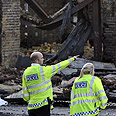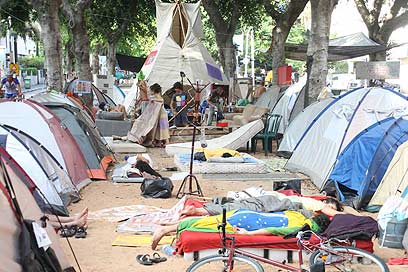
Can UK riots spill over to Israel?
Experts claim massive differences between Britain, Israel won't allow for eruption of hooligan violence here
Piccadilly Circus vs. Habima Square: At this stage of the global news cycle it seems any country around the world could find itself engulfed by a wave of social protest threatening national order. The Arab spring – a series of events which destabilized many Middle Eastern regimes – was only the starting point for global protests, it seems.
One can thus easily draw parallels between the riots plaguing Britain recently and Israel's very own "tent protest," alleging that social-economic depravity links the two events. A closer look will reveal slightly different conclusions, though the principles remain the same.
- Receive Ynetnews updates directly to your desktop
Professor Daniel Gottwein of the Haifa University claims there is a massive difference between the Israeli and British protest. "In Israel it's a protest of the middle class which views itself as the pillar of society and is struggling for a social agenda," he said. "In Britain, however, it is members of the lower classes and minorities who protest. They see themselves as society's rebels and are therefore not part of the rules of the game."
Gottwein stresses that while Israel's protesters believe that a change can be effected within the current political system rather than aiming to topple the government, Britian's protest reflects a comprehensive lack of trust in the political system."
The professor nevertheless claims that UK riots need to raise alarm signs in Israel. "The protest here must also include elements of the periphery's lower class which feels itself excluded from society."
Gottwein believes that Israel's social-economic protest is made up of people who view themselves part of the establishment and believe they have the power to change reality. "In this respect, to act violently would mean to cause damage to oneself. The protesters have faith in the rules of the game."

Chaos in the streets of London (Photo: MCT)
Doctor Elisheva Sadan, an expert on social protest at the Hebrew University, explains that the British protest involves peripheral groups and ethnic minorities "who feel that the UK is not their home."
"They identify with family or close community, rather than the state."
Sadan emphasizes the difficulty entailed in the British class system which prevents mobility "so much so that one can be denied a job as an insurance clerk because of one's accent."

Tel Aviv's "tent city." A protest of the middle class (Photo: Motti Kimchi)
In Israel, however, classes are not predefined, Sadan says, adding that people who by any criteria should belong in the lower class identify themselves as members of the middle class.
The doctor also claimed that as Israel is a small country "where everyone knows everyone," looting a neighbor's shop will be considered illegitimate. "The British, however, do not know their neighbors, do no see a chance for change and that is why their rage manifests itself in the form of violence and anarchy. "
According to Sadan, "the sense one gets from the Israeli protest is that the social-economic mistake can be changed and in order to fix it one needs to work within society's laws and not outside them."
- Follow Ynetnews on Facebook










